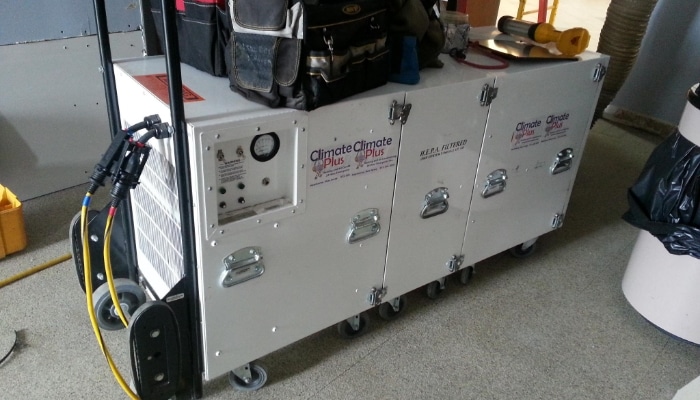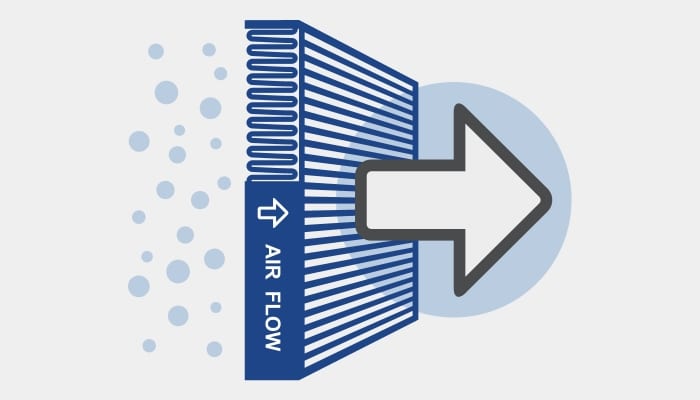Protect Your Oak Ridge, NJ Home's Environment With Indoor Air Quality Services
Depending on who you ask, the air in your home can be anywhere from five times to 100 times more polluted than the air outside. Now, we'll grant you that is quite a range - but honestly, even if it's just twice as polluted, that's still unacceptable - because in your home, you have some say in the matter. With the indoor air quality services available from Climate Plus, you can exert your will over your home's environment and keep you and your family safe and healthy.
There are many systems we can install in your home to help improve its overall air quality, each one geared toward giving you clean, fresh air to breathe and keeping the evils of the air outside right where it belongs - out. If you've got dust everywhere, allergies that just won't quit or a cough that won't go away, it's imperative you give us a call at (973) 838-3200 and truly "clear the air."

Indoor air quality can be poor due to several problems. Common reasons include inadequate ventilation, which traps pollutants indoors; indoor sources of pollution like tobacco smoke, household cleaners, and cooking fumes; allergens like pet dander, dust mites, and mold spores; and outdoor pollutants that enter through open windows and doors. Poorly maintained HVAC systems can also contribute to indoor air quality issues. To improve indoor air quality, ensure proper ventilation, maintain HVAC systems, use air purifiers or filters, and minimize indoor pollutants through regular cleaning and proper ventilation practices.
Indoor air quality can be tested through various methods. One common approach is using indoor air quality monitors that measure pollutants like particulate matter, volatile organic compounds (VOCs), carbon dioxide (CO2), and humidity levels. Additionally, professional air quality testing services can perform comprehensive assessments to identify specific pollutants like mold, radon, or formaldehyde. Home test kits are also available for some pollutants, but professional testing is more accurate. Analyzing test results can help identify sources of indoor air pollution and guide improvements through ventilation, air purifiers, and reducing pollutant sources.
Poor indoor air quality can lead to various health effects, including respiratory issues like coughing, wheezing, and throat irritation. It can exacerbate allergies, asthma, and other respiratory conditions. Long-term exposure may increase the risk of developing respiratory infections, cardiovascular diseases, and even cancer. Additionally, poor indoor air quality can cause headaches, fatigue, and concentration problems. Improving indoor air quality through proper ventilation, filtration, and reducing indoor pollutants is crucial for maintaining overall health and well-being.
Volatile Organic Compounds (VOCs) are chemicals emitted as gases from various household products and materials, contributing to indoor air pollution. Common sources include paints, cleaning agents, furniture, and carpets. To reduce VOC levels indoors, opt for low-VOC or VOC-free products, increase ventilation by opening windows or using exhaust fans, and maintain a healthy humidity level. Additionally, storing chemicals properly and avoiding smoking indoors can help minimize VOC exposure and promote better indoor air quality.
What Kind Of Pollution Is In My Home?
What kind of pollution isn't in your home? Everything outside eventually makes its way in - what's important is what happens to it during the trip. When you add in the pollution a family can produce - dust, bacteria, animal dander and the explosive results of Dad's prize-winning pork roll - into that enclosed space and it's easy to see how things can be more polluted inside than out. Here are some of the usual suspects:
Dust - Do you know what dust is made of? Do you even want to know? Too bad, we're telling you. An unholy concoction of soil, dust mites, microscopic plastic, hair, bacteria and dead human skin cells, dust is, quite simply, an awful thing to breathe in. VOCs - Have you recently painted your home? Put in a nice, new cozy couch? Paints, home furnishings, carpets and more give off VOCs - otherwise known as volatile organic chemicals - when they're new. Side products of the manufacturing process, VOCs have been linked to multiple health conditions. Pollen - Nobody likes a stowaway. While it may be normal to think of pollen as an exterior allergen only, it can cling to your clothes and steal itself a ride right into your home. When it does, your home will offer no sanctuary from your usual springtime sneezefests. Disease - We're more aware than ever of how bacteria and viruses can hang around in the air, making us and those around us sick. It's important to address this fact to properly care for your family's health. Cigarette Smoke - No judgment, but if you smoke in your home, you have to admit that your family is smoking with you. Second hand smoke can linger on the air and in furniture for a long time, and the attendant health effects for others can be profound.
That's just a sampling. Our bodies are built to breathe a very specific mix of nitrogen, argon and most importantly, oxygen. Anything else can potentially impact our health. The evidence is clear - caring for your home's indoor air quality is one of the most important things you can do.

How Do You Improve Indoor Air Quality?
We know all of the above sounds scary, but don't you worry - we've got this. One of the first things we can do is help you with regular maintenance of your HVAC systems - the better it's maintained, the cleaner the air it puts into your home. Those air filters you need to change every month are there for a reason! But that's just the start:
Air Filtration
The aforementioned filters are good for basic air cleaning, but if you really want to up your game, whole home air filtration is the answer. There are filters powerful enough they not only keep out dust and dander - they can even snag bacteria and viruses, right out of the air.
UV Lights
Sci-Fi laser weapons are awesome, right? Well, UV lights aren't quite the same thing - but they're close. UV radiation is capable of deactivating organic allergens like bacteria and viruses or breaking down mold (the same way it gives you sunburn). Adding UV light purification to your system gives you a front-line defense against unhealthy invaders.
Humidifiers & Dehumidifiers
Too much water in the air and you encourage the growth of mildew, mold and bacteria and risk damaging your walls, floors and furniture. Not enough and you wind up with dry eyes, scratchy throats and general discomfort. Our whole home humidifiers and dehumidifiers help you achieve that perfect sweet spot between the two.
Duct Cleaning
Using powerful negative air machines, in our duct cleaning services we thoroughly remove dust, allergens, pet dander, and other contaminants from your ductwork without spreading debris into your home. Unlike basic cleanings, our service also includes disinfecting to eliminate bacteria, mold, and odors, improving indoor air quality and helping your HVAC system run more efficiently.
Start On The Path To Breathing Easier
We get it - it's not pleasant to think about what you and your family could be breathing in while in the expected safety of your home. But you don't have to just accept it. By taking action now, you can clean up your home's atmosphere and ensure happy and healthy living for you and your family for years to come. Message us online or call us at (973) 838-3200 for a consultation today!





